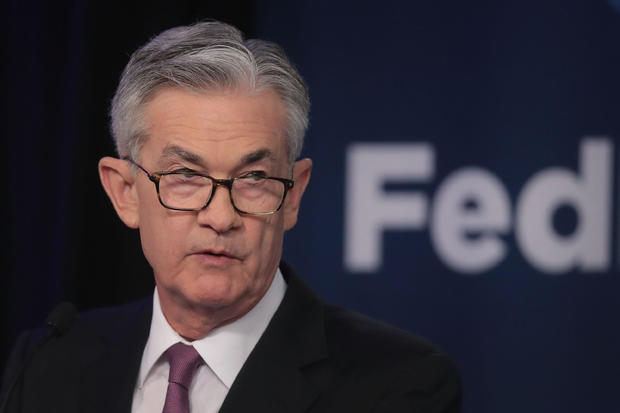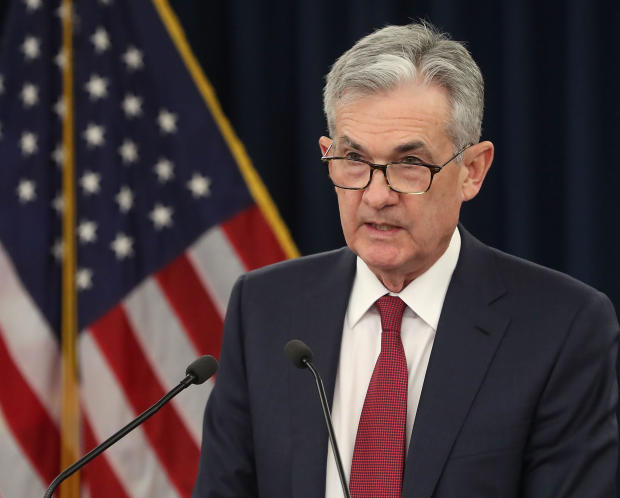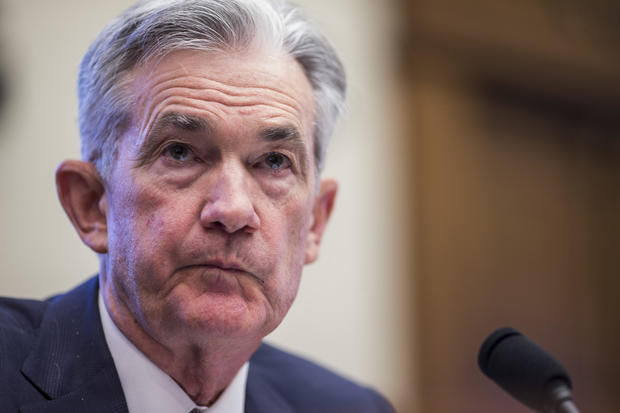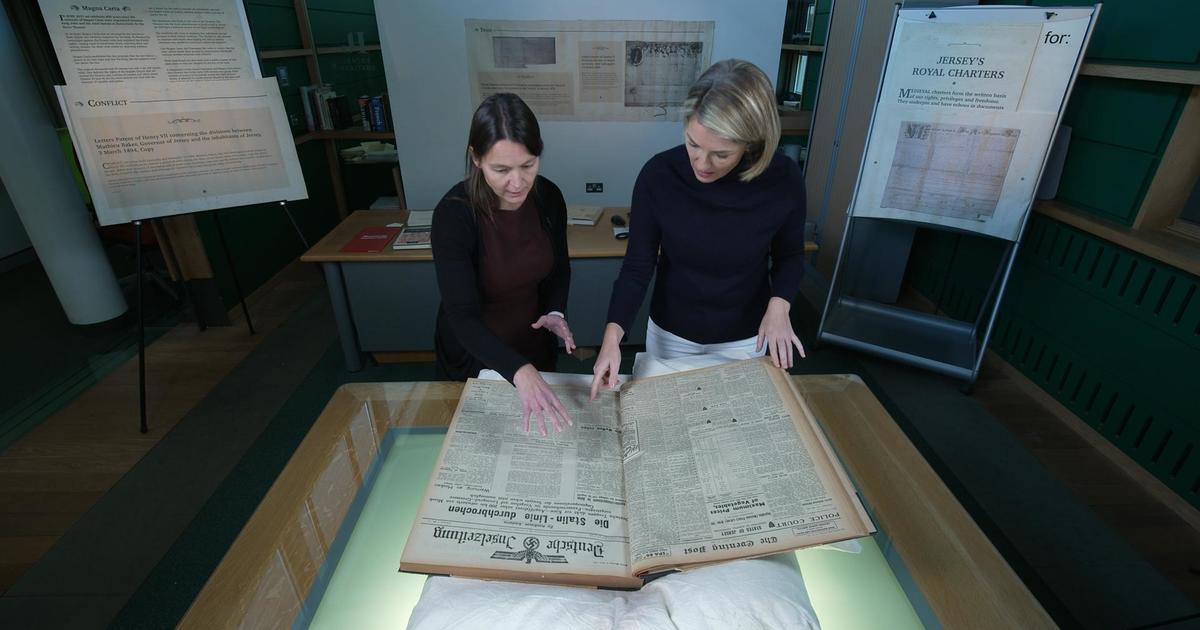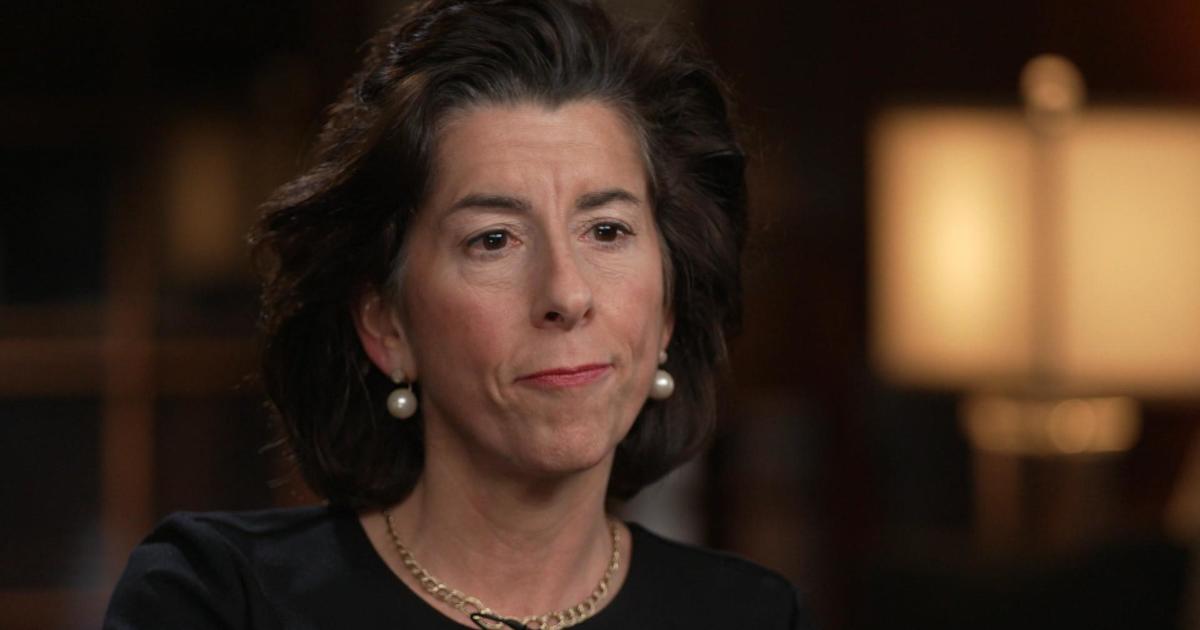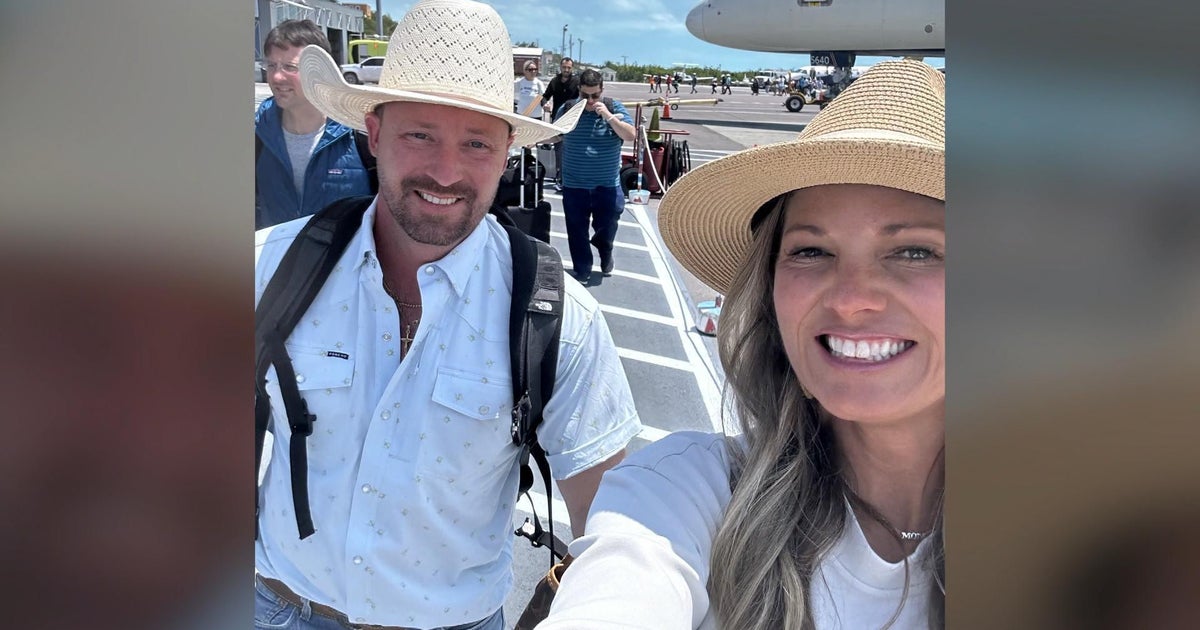Federal Reserve Chairman Jerome Powell on the coronavirus-ravaged economy
Jerome Powell shook Washington, Wall Street and the world this past week when he warned the pandemic crisis threatens "lasting damage" to American prosperity. As chairman of the Federal Reserve, Powell is among the most powerful people in the economy. He acted swiftly in the sharpest collapse since the Great Depression, but he fears Congress's initial $3 trillion bailout will not be enough to save a generation from low growth and stagnant incomes. We asked Chairman Powell how high unemployment will go and how long it will take to see a recovery. He spoke to us this past Wednesday, after a blunt speech that gave markets a shove.
- Full Transcript: Fed Chair Jerome Powell's 2020 60 Minutes interview
- Why the Federal Reserve chair keeps talking to 60 Minutes
- Fed Chair Powell: The US won't have negative interest rates
Scott Pelley: Mr. Chairman, I just got a push notification on my phone: "Dow tanks more than 500 points in Wall Street sell-off after Fed chair warns economic recovery will be prolonged and bumpy." You knew that was coming.
Jerome Powell: I've been watching the markets.
Truth is, the markets have been watching him. His speech Wednesday was a warning and a prayer. He raised the specter of a "prolonged recession and weak recovery" if the federal government doesn't use all its power to support business and workers.
Jerome Powell: I was really calling out a risk that I think is an important one for people to be cognizant of, the risk of longer-run damage to the economy. And really, the good news is that we have the tools to limit that longer-run damage by continuing to provide support to households and businesses as we get through this.
Scott Pelley: What metrics are you looking at here hour by hour, day to day, to divine what the future is going to be?
Jerome Powell: The thing that matters more than anything else is the medical metrics, frankly. It's the spread of the virus. The real-time economic data that we're seeing is just a function of how successful the social distancing measures are. So, the data we'll see for this quarter, which ends in June, will be very, very bad. There'll be a, you know, big decline in economic activity, big increase in unemployment. So what we're really looking at is getting the medical data, which is not what we usually look at, taken care of so that the economic data can start to recover.
Congress has already spent $3 trillion on relief. But another $3 trillion, passed Friday by House Democrats, is a dead letter in the Senate amid a partisan debate over how much to borrow.
Donald Trump: We're in no rush. We're in no rush.
Talk of slowing the economic response is among the reasons Powell is speaking tonight. He's a Republican, appointed by President Trump.
Jerome Powell: Congress has done a great deal and done it very quickly. There is no precedent in post-World War II American history that's even close to what Congress has done. And the question is, will it be enough? And I don't think we know the answer to that. It may well be that the Fed has to do more. It may be that Congress has to do more.
Scott Pelley: As this period of time grows longer, what begins to happen to the economy?
Jerome Powell: There's a real risk that if people are out of work for long periods of time, that their skills atrophy a little bit and they lose contact with the workforce. Longer and deeper recessions tend to leave behind damage to people's careers. The small and medium size businesses that are so important to this country, if they have to go through a wave of avoidable insolvencies, you have-- you've lost something there that's more than just a few businesses, you know, it's really the job creation machine. Keeping people and businesses out of insolvency just for maybe three or six more months while the health authorities do what they can do. We can buy time with that.
Scott Pelley: I was speaking to a former official of the Federal Reserve who said, "V-shape recovery, off the table. There's no chance."
Jerome Powell: Well, I would say the main thing is to get back on the road to recovery. And I think that can happen relatively soon, likely to happen in the second half of the year. That's a reasonable expectation. After that, the path is going to depend on a range of things. It's very plausible that the economy will take some time to gather momentum.
We spoke to Powell in the Federal Reserve boardroom. The Washington headquarters was otherwise silent, its staff working from home. The building, dedicated in 1937 by FDR, was itself a Depression-era project to create construction jobs. The Fed is the source of all U.S. currency and it regulates the economy by setting interest rates. In the Depression, it was given vast power to lend money in an emergency. It used that authority for the first time in the 2008 collapse and for the second time, nine weeks ago.
Scott Pelley: Has the Fed done all it can do?
Jerome Powell: Well, there is a lot more we can do. We're not out of ammunition by a long shot. No, there's, there's really no limit to what we can do with these lending programs that we have.
In March, as the Dow collapsed 8,000 points and credit markets began to freeze, Powell called an emergency meeting on a Sunday. He cut interest rates to near zero, and, in partnership with the treasury, the Federal Reserve offered more than $3 trillion in lending to banks, businesses, cities and states. With that assurance, the credit markets, essential to daily business, began to function again.
Scott Pelley: Fair to say you simply flooded the system with money?
Jerome Powell: Yes. We did. That's another way to think about it. We did.
Scott Pelley: Where does it come from? Do you just print it?
Jerome Powell: We print it digitally. So we-- you know, we-- as a central bank, we have the ability to create money digitally and we do that by buying Treasury Bills or bonds or other government guaranteed securities. And that actually increases the money supply. We also print actual currency and we distribute that through the Federal Reserve banks.
But, by law, Chairman Powell's Federal Reserve can only lend money that must be paid back. Congress, he believes, should spend money to expand its historic bailout. After all, he says, this emergency is nothing like 2008.
Jerome Powell: This is not because there was some inherent problem, a housing bubble, or something like that, or the financial system in trouble, nothing like that. The economy was fine. The financial system was fine. We're doing this to protect ourselves from the virus. And that means that when the virus outbreak is behind us, the economy should be able to recover substantially.
Scott Pelley: And what sort of support, in your view, do you think the Congress would want to consider?
Jerome Powell: I don't give them advice on particular policies. But I would say, if I may, that-- policies that-- that help businesses avoid avoidable insolvencies and that do the same for individuals. Keep workers in their homes, keep them paying their bills. Keep families solvent.
Among the options: extending the increase in unemployment benefits which expires in July and supporting local governments which are struggling with a collapse in tax revenue. Powell believes trillions in additional federal debt could be paid down over decades.
Jerome Powell: The U.S. has been spending more than it's been taking in for some time. And that's something we're going to have to deal with. The time to do that is when the economy is strong. When unemployment is low, when economic activity is high, that's when you deal with that problem. This is not the time to prioritize that concern. We have the ability to borrow at low rates. We have the ability to service that debt. And I would say this is the time when we can use that strength to our longer run benefit.
Scott Pelley: What economic reality do the American people need to be prepared for?
Jerome Powell: Well, I would take a more optimistic cut at that, if I could, and that is, this is a time of great suffering and difficulty. And it's come on us so quickly and with such force, that you really can't put into words the pain people are feeling and the uncertainty they're realizing. And it's going to take a while for us to get back. But I would just say this. In the-- in the long run, and even in the medium run, you wouldn't want to bet against the American economy. This economy will recover. It may take a while.
It may take a period of time. It could stretch through the end of next year. We really don't know.
Scott Pelley: Can there be a recovery without a reasonably effective vaccine?
Jerome Powell: Assuming there's not a second wave of the coronavirus, I think you'll see the economy recover steadily through the second half of this year. So, for the economy to fully recover people will have to be fully confident and that may have to await the arrival of a vaccine.
If an effective vaccine arrives, millions of doses are likely well over a year away. This month, President Trump pressed states to reopen without a vaccine or adequate testing.
Donald Trump: Well, I feel about vaccines like I feel about tests. This is going to go away without a vaccine. It's going to go away, and it's-- we're not going to see it again, hopefully, after a period of time.
Chairman Powell says vaccine development is highly uncertain and until then, major industries will suffer.
Jerome Powell: The parts that involve people being in the same place very close together. Those parts of the economy will be challenged until people feel really safe again.
Scott Pelley: Sporting events, theaters?
Jerome Powell: I would think those would be very difficult.
Scott Pelley: Airlines?
Jerome Powell: It'll be quite challenging for them. Lots of the rest of the economy though can move, can move ahead. But we can't fully recover because those other parts of the economy matter. We can't fully recover though until people feel confident that they're safe.
Scott Pelley: You are an enormous fan of the Washington Capitals. When do you think you're going to be comfortable going back to a game?
Jerome Powell: Certainly no sooner than next season. Generally, public sporting events, public concerts and things like that, those will be among the last things that can be resumed.
Most states are taking early steps to reopen even though the U.S. lacks the testing capacity experts say is indispensable to success.
Scott Pelley: If the economy reopens and the infection rate surges, what then?
Jerome Powell: The government would have to reintroduce the social distancing measures. And you would have another downturn. And that would be bad for confidence. So that's a risk we really want to avoid. You know, the virus hasn't gone away. The reason that cases have gone down and are declining is because people have been in their homes and not in their businesses and not out among crowds.
Powell told us the economy will shrink dramatically in the second quarter, April, May and June, at an annualized rate of around 30%. This past week, the Labor Department reported a total of more than 35 million Americans had lost their jobs so far. The unemployment rate will be historic.
Scott Pelley: And your people are projecting what, 20%? 25%?
Jerome Powell: There're a range of perspectives. But those are-- those numbers sound about right for what the peak may be.
Scott Pelley: 25% is the estimated height of unemployment during the Great Depression. Do you think history will look back on this time and call this the Second Great Depression?
Jerome Powell: No, I don't. I don't think that's a likely outcome at all. We had a very healthy economy two months ago. Our financial system is strong. You have governments around the world and central banks around the world responding with great force and very quickly. And staying at it. So, I think all of those things point to what will be-- it's going to be a very sharp downturn. It should be a much shorter downturn than you would associate with the 1930s.
Scott Pelley: You expect the third quarter to see growth?
Jerome Powell: It's a reasonable expectation that there'll be growth in the second half of the year. I would say though we're not going to get back to where we were quickly. We won't get back to where we were by the end of the year. That's unlikely to happen.
Scott Pelley: In terms of the workforce, Mr. Chairman, who is getting hurt the worst by this downturn?
Jerome Powell: The people who're getting hurt the worst are the most recently hired, the lowest paid people. It's women to an extraordinary extent. Of the people who were working in February, who were making less than $40,000 per year, almost 40% have lost their jobs in the last month or so.
Scott Pelley: What gives you hope in this dark time?
Jerome Powell:. We have highly industrious people. We have the most dynamic economy in the world. And, you know, we're the home of so much of the great technology in the world. So, in the long run, I would say the U.S. economy will recover. We'll get back to the place we were in February; we'll get to an even better place than that. I'm highly confident of that. So, I think we're going to need to help each other through this. And we will.
Produced by Henry Schuster. Associate producer, Sarah Turcotte. Broadcast associate, Ian Flickinger. Edited by April Wilson.
